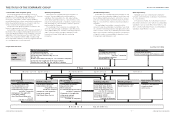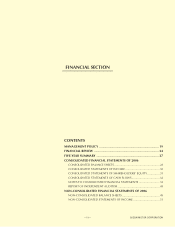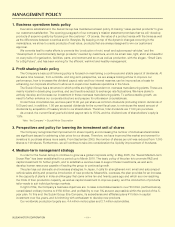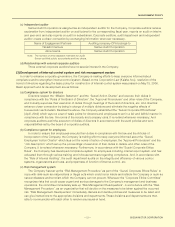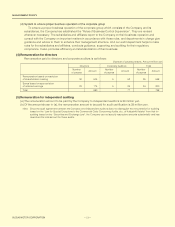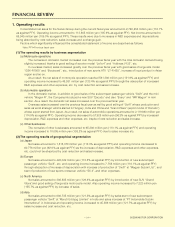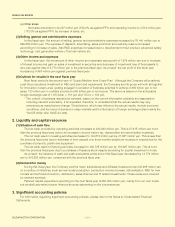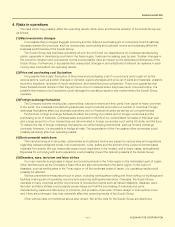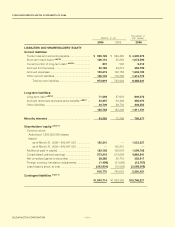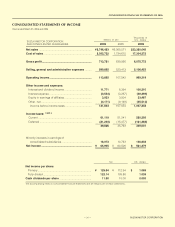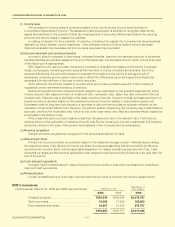Suzuki 2006 Annual Report Download - page 26
Download and view the complete annual report
Please find page 26 of the 2006 Suzuki annual report below. You can navigate through the pages in the report by either clicking on the pages listed below, or by using the keyword search tool below to find specific information within the annual report.
SUZUKI MOTOR CORPORATION
4. Risks in operations
The risks which may possibly affect the operating results, stock price and financial situation of the Suzuki Group are
as follows:
(1) Macro-economic changes
It is possible that prolonged sluggish economy and the reduced purchasing will of consumers could drastically
decrease demand for products, such as motorcycles, automobiles and outboard motors and adversely affect the
business performances of the Suzuki Group.
The Suzuki Group has business operations all over the world and our dependence on overseas manufacturing
plants, especially in developing countries in the Asian region, has been increasing year by year. Sudden changes in
the economic situation and unexpected events could possibly have an impact on the business performances of the
Suzuki Group. Furthermore, it is possible that unexpected changes in and adoptions of different tax systems in each
country also could affect our operating results.
(2) Price and purchasing cost fluctuation
It is possible that drastic fluctuation of the prices and purchasing cost of our products are brought on by the
various factors, such as sudden changes in demand, supply shortages and price-up of parts and materials, unstable
economic situations, revisions of import restrictions, and intensified price competition. There is no guarantee that
these fluctuations will reduce or that they will never occur in markets where they have never occurred before. It is
possible that drastic price fluctuations could damage the operating results in any market where the Suzuki Group
operates.
(3) Foreign exchange fluctuation
The Company exports motorcycles, automobiles, outboard motors and their parts, from Japan to many countries
in the world. Our overseas manufacturing bases also export products and parts to a number of countries. Foreign
exchange fluctuations affect our business operations and our financial situation as well as our competitiveness.
Furthermore, foreign exchange fluctuations affect the pricing of products sold in foreign currencies and the
purchasing price of materials. Overseas sales accounted for 66.0% of our consolidated net sales of this fiscal year
and a large proportion of our transactions are denominated in foreign currencies, such as the US dollar and the Euro.
To reduce the risk of foreign exchange fluctuations, we utilize hedging instruments, such as forward exchange
contracts. However, it is impossible to hedge all risks. The appreciation of the Yen against other currencies could
possibly adversely affect our operating results.
(4) Environmental restrictions
The manufacturing of motorcycles, automobiles and outboard motors are subject to various laws and regulations
regarding exhaust emissions levels, fuel consumption, noise, safety and the amount of the output of contaminated
materials from plants. We can reasonably expect such regulations to be revised, and in many cases, strengthened.
Expenses for complying with such regulations could possibly impact the operating results of the Suzuki Group.
(5) Disasters, wars, terrorism and labor strikes
Our main manufacturing bases in Japan are located primarily in the Tokai region in the mid-eastern part of Japan.
Other facilities such as the Company’s head office are also concentrated in the same region. In the event of
disasters, such as earthquakes in the Tokai region or off the southeast coast of Japan, our operating results could
possibly be affected.
Various preventative measures are put in place, including earthquake-proofing and fire-proofing our buildings and
facilities, making plan of operating recovery and acquiring earthquake insurance. Overseas, the Suzuki Group
operates in many countries and the occurrences of unexpected events such as natural disasters, diseases, wars,
terrorism and labor strikes could possibly cause delays and halt the purchasing of materials and parts,
manufacturing, sales and distribution of products, and provision of services. If these delays or interruptions occur
and if they are prolonged, they may adversely affect the operating results of the Suzuki Group.
Other various risks not mentioned above also remain. Not all the risks for the Suzuki Group are listed here.
FINANCIAL REVIEW
26


